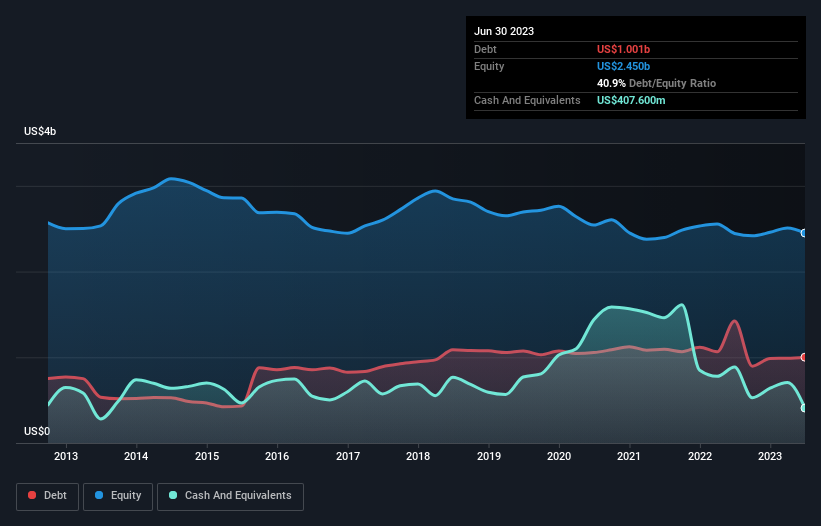- United States
- /
- Professional Services
- /
- NYSE:MAN
These 4 Measures Indicate That ManpowerGroup (NYSE:MAN) Is Using Debt Reasonably Well

Some say volatility, rather than debt, is the best way to think about risk as an investor, but Warren Buffett famously said that 'Volatility is far from synonymous with risk.' When we think about how risky a company is, we always like to look at its use of debt, since debt overload can lead to ruin. We can see that ManpowerGroup Inc. (NYSE:MAN) does use debt in its business. But is this debt a concern to shareholders?
When Is Debt Dangerous?
Debt and other liabilities become risky for a business when it cannot easily fulfill those obligations, either with free cash flow or by raising capital at an attractive price. If things get really bad, the lenders can take control of the business. However, a more common (but still painful) scenario is that it has to raise new equity capital at a low price, thus permanently diluting shareholders. Having said that, the most common situation is where a company manages its debt reasonably well - and to its own advantage. The first thing to do when considering how much debt a business uses is to look at its cash and debt together.
See our latest analysis for ManpowerGroup
What Is ManpowerGroup's Debt?
The image below, which you can click on for greater detail, shows that ManpowerGroup had debt of US$1.00b at the end of June 2023, a reduction from US$1.42b over a year. However, it does have US$407.6m in cash offsetting this, leading to net debt of about US$593.5m.

How Strong Is ManpowerGroup's Balance Sheet?
According to the last reported balance sheet, ManpowerGroup had liabilities of US$4.62b due within 12 months, and liabilities of US$1.80b due beyond 12 months. Offsetting this, it had US$407.6m in cash and US$4.98b in receivables that were due within 12 months. So it has liabilities totalling US$1.04b more than its cash and near-term receivables, combined.
This deficit isn't so bad because ManpowerGroup is worth US$3.72b, and thus could probably raise enough capital to shore up its balance sheet, if the need arose. But it's clear that we should definitely closely examine whether it can manage its debt without dilution.
We use two main ratios to inform us about debt levels relative to earnings. The first is net debt divided by earnings before interest, tax, depreciation, and amortization (EBITDA), while the second is how many times its earnings before interest and tax (EBIT) covers its interest expense (or its interest cover, for short). This way, we consider both the absolute quantum of the debt, as well as the interest rates paid on it.
ManpowerGroup has a low net debt to EBITDA ratio of only 0.94. And its EBIT covers its interest expense a whopping 15.6 times over. So you could argue it is no more threatened by its debt than an elephant is by a mouse. On the other hand, ManpowerGroup's EBIT dived 17%, over the last year. We think hat kind of performance, if repeated frequently, could well lead to difficulties for the stock. When analysing debt levels, the balance sheet is the obvious place to start. But it is future earnings, more than anything, that will determine ManpowerGroup's ability to maintain a healthy balance sheet going forward. So if you want to see what the professionals think, you might find this free report on analyst profit forecasts to be interesting.
Finally, a company can only pay off debt with cold hard cash, not accounting profits. So the logical step is to look at the proportion of that EBIT that is matched by actual free cash flow. Over the most recent three years, ManpowerGroup recorded free cash flow worth 67% of its EBIT, which is around normal, given free cash flow excludes interest and tax. This cold hard cash means it can reduce its debt when it wants to.
Our View
When it comes to the balance sheet, the standout positive for ManpowerGroup was the fact that it seems able to cover its interest expense with its EBIT confidently. But the other factors we noted above weren't so encouraging. In particular, EBIT growth rate gives us cold feet. When we consider all the elements mentioned above, it seems to us that ManpowerGroup is managing its debt quite well. But a word of caution: we think debt levels are high enough to justify ongoing monitoring. We'd be motivated to research the stock further if we found out that ManpowerGroup insiders have bought shares recently. If you would too, then you're in luck, since today we're sharing our list of reported insider transactions for free.
Of course, if you're the type of investor who prefers buying stocks without the burden of debt, then don't hesitate to discover our exclusive list of net cash growth stocks, today.
New: Manage All Your Stock Portfolios in One Place
We've created the ultimate portfolio companion for stock investors, and it's free.
• Connect an unlimited number of Portfolios and see your total in one currency
• Be alerted to new Warning Signs or Risks via email or mobile
• Track the Fair Value of your stocks
Have feedback on this article? Concerned about the content? Get in touch with us directly. Alternatively, email editorial-team (at) simplywallst.com.
This article by Simply Wall St is general in nature. We provide commentary based on historical data and analyst forecasts only using an unbiased methodology and our articles are not intended to be financial advice. It does not constitute a recommendation to buy or sell any stock, and does not take account of your objectives, or your financial situation. We aim to bring you long-term focused analysis driven by fundamental data. Note that our analysis may not factor in the latest price-sensitive company announcements or qualitative material. Simply Wall St has no position in any stocks mentioned.
About NYSE:MAN
ManpowerGroup
Provides workforce solutions and services under the Talent Solutions, Manpower, and Experis brands worldwide.
Undervalued with moderate growth potential.
Similar Companies
Market Insights
Community Narratives




